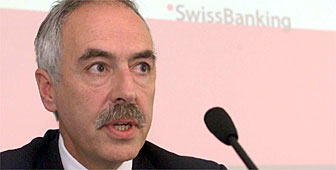
Banking issues to test Swiss-EU relations

Swiss bankers predict clashes between Switzerland and the European Union in upcoming talks on privacy, interest income and other issues.
Urs Roth, chief executive officer of the Swiss Bankers Association, said the taxation of interest income, combating fraud and the Schengen/Dublin agreements on security and asylum were all of “particular importance” for Switzerland.
In the coming months, the topics will be part of the EU economic agenda, and Switzerland’s financial and political agenda. At a news conference on Wednesday, Roth said Switzerland had presented Brussels with proposed regulations to resolve such problems as customs fraud, and in particular cigarette smuggling.
Both Switzerland and the EU have been trying since 1998 to improve measures to fight the customs fraud.
Taxable income
Roth said the association agreed with the government’s view on the issue of interest income, saying Swiss banks had no intention of attracting transactions aimed at evading the EU’s tax on interest income. However, banking secrecy was not up for negotiation with Brussels, he repeated.
After a seven-year transition period, there will be a general obligation to report all cross-border interest income paid to private individuals resident in the EU – a regulation that has even attracted criticism within the EU itself.
For instance, a German or Belgian who earns income from an account in a French bank must report that income to the tax authorities.
Switzerland has proposed introducing a paying agency tax, a kind of withholding tax, which it believes is a “generous” solution. But it argues that equivalent solutions should also apply to other third-party states, for example the United States, Singapore, Hong Kong and Japan.
Roth told swissinfo that the most important issues are the initiative by the EU for a tax on interest and savings.
“There we have the question on whether Switzerland should adopt the same measures, should we and other countries outside of the EU after seven years adopt a system of automatic information exchange,” explained Roth. “We will not agree to an automatic system of exchange on that basis, we would offer the EU instead a kind of withholding tax we would levy on interest and savings.”
Customer confidentiality
Roth remained firm on the subject of banking customer confidentiality, which is anchored in Swiss legislation.
With regard to criminal investigations, he argued that Switzerland had provided legal assistance in criminal matters for many years and that funds of criminal origin were not protected by Swiss bank customer confidentiality.
However, he was wary of any broad expansion of powers that could affect confidentiality.
“We cannot allow a situation where bank customer confidentiality will be whittled away through a sweeping expansion of official assistance procedures,” without Switzerland having a say in the matter, he said.
“If the EU is committed to finding an effective and rapid solution to the problems of customs fraud – and is not trying to compete with the successful financial centre in Switzerland – it should surely be receptive to Switzerland’s proposals,” he commented.
As for the Schengen/Dublin accords, Roth said Swiss banks were “positively disposed” to the basic principle, but there were a few important reservations regarding content.
He told swissinfo that the accords had merits and will be “important for Switzerland” on certain policies.
“But there is the point where the Swiss banks must say that we agree to an exchange of information if tax fraud is concerned and based on our principles of law that are based among other things on a defendant’s right to appeal against an exchange of information.”
Patriot Act
Roth also referred to the United States’ package of legal provisions, known as the Patriot Act, designed to make it more difficult to finance acts of terrorism in the wake of the September 11 attacks.
He said the legal provisions were “pushed through” Congress in record time and practically without debate.
He noted that US banks and securities firms would now be subject to new due diligence requirements when dealing with foreign clients, although it had been emphasised that in dealings with domestic US clients, no new “know your customer” regulations would apply.
“It is pleasing to note that financial intermediaries will now be subject to a number of due diligence requirements which have been in place in Switzerland and other countries for the last ten years,” he commented.
Measures aimed at foreigners
“What is considerably less encouraging is the fact that all the measures are aimed exclusively at foreigners and that there are still no comparable due diligence requirements regarding domestic clients.”
“We must convince the US authorities to continue with the tried and tested channels of administrative and legal assistance in order to obtain information and not to resort to unilateral coercion,” he added.
Also on Wednesday, the association’s chairman, Georg Krayer, spoke of the role of the banks in an economy, with particular reference to last year’s collapse of Swissair.
swissinfo with agencies

In compliance with the JTI standards
More: SWI swissinfo.ch certified by the Journalism Trust Initiative

























You can find an overview of ongoing debates with our journalists here . Please join us!
If you want to start a conversation about a topic raised in this article or want to report factual errors, email us at english@swissinfo.ch.